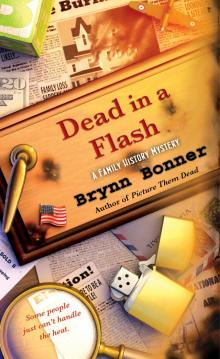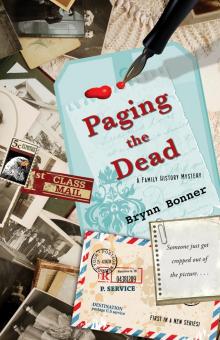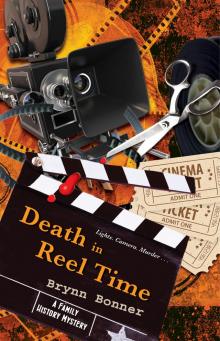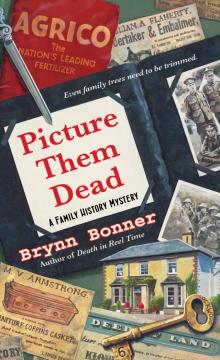- Home
- Brynn Bonner
Paging the Dead Page 10
Paging the Dead Read online
Page 10
Porter kept his eyes fixed on the ducks. We sat in silence for a few beats and then he said, “I knew your daddy; he was a good man. Knew your mama, too. You look like her. Your daddy was a straight shooter. Always said exactly what he meant and meant what he said.”
“Yes, he did.”
“I appreciate that in a person,” Joe Porter went on. “So instead of dancing around it, why don’t you just come out and ask me what it is you’d like to know about me and Dorothy. I know how it is in a small town. I’m sure there’s people saying harsh things about me. Some maybe even saying I killed her.” He swallowed hard and looked out across the lake, wincing.
“No one’s saying that,” I said.
“Yeah, they are,” Jack countered from his seat on the grass.
I gave him my most withering look.
“What?” Jack protested. “They are. I’m just saying Mr. Porter’s right, it’s a small town and people who don’t know what they’re talking about still talk.”
“Call me Joe, I’m not much on ceremony,” Porter said. “People talk, it’s just the nature of things. As long as people who know me don’t doubt me the others can blather on much as they please. Me and Dorothy, we’d been through a lot.”
“I’ve seen the photos,” I said. “You two looked very happy in the earlier days.”
“We were,” Joe said. “As happy as Dorothy ever allowed herself to be, anyway—despite her daddy’s interference. You know we weren’t exactly kids when we married. She was forty-three years old and me a few years younger. She defied her father to marry me, the one and only time she ever did that. He made it hard on us, but I think in some ways that brought us closer, for a while anyhow.”
I found myself liking Joe Porter, but I decided to test out his claim that he liked straight talkers.
“I think one thing that’s feeding the rumor mill is the speculation about who’ll inherit the Pritchett estate,” I said. “Do you know what’s in Dorothy’s will?”
Joe pulled back as if I had bad breath and I saw Jack’s eyes go wide.
“Sorry, you said you like things straight out,” I said.
“Eh, so I did,” Joe said, tossing out more corn to the squawking ducks. “I have no idea who’ll inherit the Pritchett estate. If there’s any justice in the world it’ll be Ingrid. But I know for sure it won’t be me. We had a pre-nup.”
“Her father’s insistence?” I asked.
Joe smiled and shook his head. “No, mine.”
“To prove to her father you loved her and weren’t marrying her for her money,” Jack said. “That’s radical.”
“Nothing quite so chivalrous, I’m afraid,” Joe said. “The truth is I was protecting my own interests. I’d built up a good business over the years and my net worth far exceeded hers, even after she inherited. I wanted to make sure my money went to support the employees who helped me. They’re loyal to me and I try to return that. I didn’t want my money to get poured into that big old house and go to keeping servants and throwing parties and what-not.”
I stole a glance at Jack and I could see he was as shocked as I was. In the in-for-a-penny tradition I asked, “Who do you think will inherit the estate?”
“Given her druthers I think Dorothy would’ve named Ingrid as her beneficiary. I know she felt guilty about getting the whole she-bang. But old William was determined that Ingrid was never to get a dime and I don’t know if Dorothy could have brought herself to defy her father’s wishes, even though he’s been in the ground for more than two decades. That’s how strong his hold on her was. She spent her whole life trying to be worthy of the Pritchett name. I purely hated that. I wish she could have realized . . .” His voice trailed off.
“Joe, what do you know about the Pritchett family ring?” I asked.
“Not a blessed thing. Don’t even know if the dang thing exists. Why are you asking about that?”
I hesitated. So the police hadn’t asked Joe Porter about the ring either.
After a moment of indecision I spilled, telling Joe about finding the ring, returning it to Dorothy and the fact that it had not been found at the crime scene.
“You mean somebody killed her for a finger bauble?” Joe made a groaning sound and leaned forward, both hands cradling his head. “Dorothy hunted for that stupid ring for years and for the last little while she’d been obsessed about it. I know it was supposed to be valuable, but that wasn’t what it was about for her. It was about being a blasted Pritchett. Everybody thinks she was a spoiled uppity woman, and she could be that,” Joe said with a sad smile. “But she paid for everything she had in one way or another. Her father put a really bad head trip on her. She could never do enough to please him. He used to bark things at her like “Pritchetts don’t cry” or “Pritchetts don’t apologize” or “Pritchetts are made of better stuff.” He expected too much out of her.”
“Like taking care of Ingrid?” I asked.
Joe nodded. “Just about raised her,” he said. “It hit her hard when her and Ingrid parted ways. But with just a little more time they could’ve been sisters again. Dorothy was making her peace with lots of things in the last year. She was just getting to where maybe she could be happy again and now she’s gone.”
“What about her relationship with Jeremy?” I asked, half expecting Joe to tell me I’d abused the straight talk privilege.
“Jeremy’s a good man,” he said, his tone indicating there were some conditions on that testament. “He’s angry, but I reckon he’s got some things to be angry about. Since him and Ingrid moved back here it’s been constantly in his face, the difference in how Dorothy lived and how his mother struggles. Plus Dorothy gave him an awful hard time about some investments he recommended. I mean, she asked his advice and he didn’t stand to make a dime from it. I think he was trying to show her he was smart about money. Nobody could have seen how things would go south in the market so quick. But she blamed him.” Joe stopped suddenly and gave me a scowl. “Wait a minute, you’ve not got it in your head that Jeremy had any part in Dorothy getting killed, have you?”
I opened my mouth to deny it, but Joe plunged on, picking up volume and outrage.
“First off, he just wouldn’t do that. He had problems with Dorothy, but he’s not that kind of man. And secondly, Cassidy loved Dorothy. Jeremy would never do anything that would hurt his daughter, come what may.”
“I don’t think Sophreena was insinuating that,” Jack said.
“No, I wasn’t,” I said quickly. “I wasn’t insinuating anything at all. I was just trying to understand the whole situation better, that’s all.”
Joe relaxed his shoulders and I said the only thing I could think of to end our visit on an up note. “You’re sure right about Cassidy. She loved Mrs. Porter and it was clear it was mutual.”
Joe smiled, rocking back on the bench. “Oh yeah, she was crazy about that child. I am, too,” he added, seemingly embarrassed by the confession. She’s cute and she is smart. Funny, too. Has she told you her knock-knock jokes?”
“No, she hasn’t,” I said.
His face went solemn. “No, I don’t suppose she’s joking much these days.”
I caught Jack’s eye and he got up from his resting place and swiped at his clothes. “We’d better ride on before we lose the light. It was good to see you, Joe.”
“Good to see you both,” he said. “I’d better be getting on home myself.” He scattered the remnants of the cracked corn at the water’s edge before crumpling the bag and putting it into the pocket of his windbreaker.
As we mounted our bikes and rode away I looked back to see Joe staring out across the water. He reached into his pocket for a hat that he hooked onto his head before walking off toward the footpath. I nearly fell off my bike.
It was a golf hat. A yellow golf hat.
twelve
ON SATURDAYS ESME AND I USUALLY TREAT OURSELVES TO A sleep-in as a pre-reward for the work we intend to do later in the day—yard work, DIY projects, car washing and o
ther Saturdayesque activities. But today we’d crawled out at an uncivilized six a.m. and were in the workroom and scrapbooking by seven. We’d been at it for an hour when Detective Carlson showed up at our door.
Seeing as how we were no longer suspects, I greeted him cordially and invited him back to the workroom. His eyes ended their sweep of the room and came to rest on Esme. He doffed an imaginary cap by way of greeting. “Ms. Sabatier.”
“Esme’s fine,” she conceded, “now that you don’t think we’re murderers. Why are you here?”
“Esme, that’s not very hospitable,” I said, which earned me an eye roll. “Would you like a cup of coffee?” I asked Carlson.
“For that we’ll all have to traipse out to the kitchen,” Esme said ungraciously. “We don’t allow food or drink in here around these things.”
“I’m fine,” Carlson said, giving me a thanks-anyway smile. “And I’ll get right to why I’m here. First off, I want to ask you both to keep an open mind, please. I’m going way out on a limb here. This is—and I can’t emphasize this enough—a strictly unofficial visit. This case has got the whole town in turmoil and the longer it goes unsolved the more people start looking cross-eyed at their neighbors and the more outlandish the rumors get. I hate seeing this happen to our town.”
“It’s terrible,” Esme agreed. “And we don’t like it either considering we’re two of the people getting the evil eye everywhere we go.”
Carlson pointed to a chair for permission to sit.
Esme nodded and he sat down but seemed to need some time to gather his thoughts. “Look, I’m a good cop,” he said finally. “But Morningside’s usually a peaceful town, thank God, and I’ve only done a handful of murder investigations. Most were drug related and not all that complicated. I’ve got a lot on the line professionally, me and Jeffers both, but that’s not the topmost thing on my mind. I hate what this is doing to my town, to my friends and neighbors. Normally we’d look for a motive and follow where it leads but in this case there seem to be motives aplenty, which frankly has us chasing our tails. Jeffers would pull a muscle yelling at me if she knew I was here,” he said, rubbing his temples, “but I’ve just got this feeling that won’t go away telling me I needed to come talk to you two. I don’t know how else to explain it and I know that sounds peculiar.”
“Not too peculiar, really,” Esme said, giving me a sidelong glance. “What is it you believe we can do?”
Carlson threw up his hands. “I don’t know. I just have this gut feeling I need to work with you two. Look it, you might know this family better than anybody around since you’ve spent months studying the Pritchetts.”
“The Pritchett family history,” I said. “We weren’t really learning much about the live ones.”
“Still,” Carlson said, “you probably know a lot about Dorothy Porter and how she lived and what was important to her. We surely learned a lot from you in that first interview on the day of the murder, Esme. You were able to point out several avenues we should investigate.”
“Detective Carlson,” Esme said, “please, do not remind me of that. I was in shock and mad. Those are not conditions I handle well when they come one-by-one. Getting them in combination turned me into a reckless tongue wagger.”
“Still,” Carlson said, “just shows you may know more than you think.”
“Actually,” I said, “we were planning to touch base with you later today about something.” I told him about how we’d found a ring with a similar appearance in the photograph of the Spencer family and how that family was connected with Dorothy.
“And you’re convinced this is the same ring you returned to Mrs. Porter on the day she died?” he asked.
“No, we’re not,” I said. “We genealogists have rules of evidence just like you cops. So, no, we’re not convinced. I’ll use one of our favorite wiggle phrases and say the ring could possibly be the same but there’s no proof as best as can be determined to date.”
“What Sophreena’s tryin’ to say,” Esme said, “is the ring we gave Dorothy looked just like the one in that picture but we got nothing but our four eyes to tell us that. You’ll have to judge for yourself.” She motioned him to the end of the table where the scrapbook pages were stacked in their protective sleeves. She handed him the magnifying loupe and pointed out the photo.
Carlson took his time, studying the image carefully. Finally he handed the loupe back to Esme. “Make that six eyes. Sure looks like the same ring to me.”
“Even if it is, we have no idea what it means,” I said.
“What do you know about this Spencer family?” Carlson asked. “Could this turn out to be some kind of Hatfield/McCoy deal?”
“We know very little about them,” I said. “But I plan to do some investigating when I get a free minute. As Vivian Evans keeps reminding us, we were hired to do a thorough job of documenting the Pritchett family and it seems the Spencers have become a part of that.”
“Vivian’s on your case, too? She calls the station four or five times a day wanting to know why we haven’t arrested somebody. She’s offering up lots of leads, most of ’em farfetched. Jeffers is out chasing down some of those.” Carlson puffed out a breath. “Okay, well, I’ll get out of here and let you get back to work. Just think over what I’ve said and maybe when you’ve got some time we can talk.” He started for the doorway then turned back. “Listen, I hope you don’t think I’m some kind of nut job with all this folderol about feelings and hunches.”
“I wouldn’t worry about that,” I said, giving Esme an arched eyebrow.
“Sophreena and I don’t judge,” Esme said. “Now, as you can see we’re swamped right now, but I suppose later we could have coffee and talk more.”
Carlson nodded. “Great, that’d be great. You’ve got my number.”
I walked him to the door and when I returned to the workroom Esme was holding up her stop-sign hand. “It’s only coffee, and it’s only for the case, Sophreena. Don’t go getting romantic notions in your head.”
• • •
We worked for two more hours then broke for a lunch of flatbread veggie sandwiches with yogurt sauce. We congratulated ourselves on eating healthy, neither of us mentioning this would nowhere near offset the calories we planned to consume later. We’d agreed to reward our hard work by going out to The Morningside Café for a fried fish supper complete with home fries, hush puppies and creamy coleslaw—and maybe topped off with apple dumplings.
“If we make as much progress this afternoon as we did this morning I’ll take an hour tonight and see what I can find out about the Spencer family,” I said.
“You go for it,” Esme said. “After we get back from supper I’m going to work a while longer and then I’m planning a rerun of last night’s hot bath and early to bed with a good book.”
As I was loading the dishwasher my friend Gina Bradford returned my call. I’d known Gina since we were college roommates. She works at the State Archives in Raleigh so I get to see her often since that’s one of my regular research haunts. She and her husband, Sam, have an eight-month-old daughter named Ella who’s the light of their lives, but from time to time even a devoted mama needs a break. We were scheduled for a girls’ night dinner and movie on Monday and I’d left her a message that I needed a raincheck.
“Why are you bailing on me?” Gina asked without preamble. “This better be good. Tell me you’ve got a date with a great guy and I’ll totally forgive you.”
“No, but thanks ever so much for rubbing that in. It’s work.” I told her about our deadline.
“They haven’t found out who did it, have they?”
“No, not that I’ve heard, and believe me, I would’ve heard. Nobody’s talking about anything else.”
“Hey, I’ve been meaning to call to tell you this,” she said, “but it’s been crazy around here. Ella’s teething like crazy and Sam’s been out of town and the nanny called in sick twice this week. Anyhow, somebody’s doggin’ your steps on the Pritchett famil
y research.”
“What do you mean?”
“There’s a guy who’s come into the Archives a couple of times recently. I’ve never assisted him but I overheard a couple of the staff talking about it after the Pritchett woman was killed, you know, like how weird it was that there were two people researching the Pritchett family and then she gets murdered.”
“Do you know what his name was?” I asked.
“I forgot, but I wrote it down. Hold on a minute, let me get my bag.”
I could hear Ella wailing in the background and had the thought maybe she’d grow up to have a career in opera. After some scrambling noises Gina came back on the line, talking between vain attempts to shush the baby. “His name was Spencer, Henry Spencer. He lives here in Raleigh someplace. I don’t have contact information, but I’m sure you can ferret that out in a heartbeat. Sorry, Sophreena, I’ve really gotta go.”
I hung up, marveling that there was a mother left the wide world over with her hearing—and her sanity—intact. I filled Esme in on what Gina had told me.
“Spencer? Well, that surely can’t be a coincidence. Maybe Mr. Henry Spencer would be interested in pooling our resources,” Esme said. “Should we try to find him and ask him?”
“My thoughts exactly,” I said.
Some people have mixed feelings about the way the Internet is remolding society, but for genealogists it’s been a gift from the technology gods, for the most part. I had contact info for Henry Spencer in less than sixty seconds; phone number, address and a map to his house. Plus I’d learned he owned a travel agency specializing in historical destinations.
I called his home number and a female answered—either that or Henry had a voice in the Michael Jackson register. I asked for Henry and the woman got cagey.
“Can I ask who’s calling?”
I summoned my friendliest down-home manner and told her I’d been doing some family history research and I’d heard that Henry was interested in the family, too. I allowed as how we might could share information.
“Oh, that,” the woman said and I sensed she wasn’t a fellow traveler when it came to the family history hobby.

 Dead in a Flash
Dead in a Flash Paging the Dead
Paging the Dead Death in Reel Time
Death in Reel Time Picture Them Dead
Picture Them Dead